- Home
- Mack Reynolds
Dawnman Planet up-2 Page 3
Dawnman Planet up-2 Read online
Page 3
Rosen said nastily, “You could have summoned till Mercury turned to ice cubes. What’s going on over there at the Octagon? What happened to…” He cut himself short.
“To Rita Daniels?” Ronny provided. “She’s okay. My supervisor asked me to come over and bring you around to discuss Rita and her assignment.”
“Yeah? And then you’d have both of us, eh? Listen, Bronston, what’s going on? Half the most important bigwigs in the system have…”
Ronny said quickly, “I don’t believe you really want to discuss this in front of the boys, here.”
“Why not?”
“That’s what my supervisor wants to talk to you about,” Ronny said mildly.
The other stared at him. He was a smaller man, even, than the Section G operative, and there was a cast of perpetual disbelief in his eyes.
He said finally to his two goons, “Go over there to the far side of the room, but keep your eye on this fella. And don’t let his size throw you off.”
They went to the room’s far end and leaned against the wall, assuming expressions of bored cynicism in the best of Tri-Di crime show tradition. Ronny wondered vaguely if it had always been thus, down through the centuries. Did the bully boys and criminal toughs of Shakespeare’s day pick up their terminology and mannerisms from watching the villains in plays and aping them? He was inwardly amused.
As yet, Rosen hadn’t asked him to be seated. However, Ron pulled up a chair across the desk from the other, his back to the two goons. He looked at the newsman.
“My supervisor wants to talk to you.”
“Before he releases Rita, eh?”
There was a certain quality about the other’s voice. Ronny assumed the room was bugged.
“I didn’t say anything like that,” he said, ever mildly. “Where did you get the idea we were holding Rita Daniels?”
“She hasn’t returned.”
Ronny shrugged. “Why couldn’t she be out having a guzzle or two?” He brought a pen from an inner pocket. “Let me have a piece of paper, will you?”
Scowling puzzlement, Rosen pushed a pad over. He failed to notice that the agent—never departing from the standard motions a man makes when he is about to jot down an item—had depressed a small stud on the supposed writing instrument’s side. He failed to notice the faintest of hisses, nor the almost microscopic-sized dart that issued from the pen and pricked into his hand.
Even as Ronny scribbled a note on the paper, Rosen, still scowling, absently scratched the back of that hand.
Ronny pushed the note over. It said, merely, Come along with me, Citizen Rosen .
Rosen read it and flushed anger. “Do you think I’m drivel-happy?” he began. Then his face went infinitesimally lax, his eyes, slightly strange. Deep in their depths, there seemed to be a trapped fear.
Ronny came to his feet. “Let’s go,” he said. “Citizen Jakes is waiting.”
“Yes. Yes, of course,” Rosen said emptily. He stood up also.
His guards reacted.
Jed blurted, “You ain’t going with this funker, are you, Boss? You said you expected him to pull some kinda quick one.”
Ronny picked up his gun from the desk, reactivated it and slid it back into its holster. He picked up the note he had written and slipped it into his side pocket. Without looking again at the musclemen, he headed for the door, followed by the chief of the Interplanetary News Octagon desk.
Back at the offices of Section G, in the Bureau of Investigation branch offices, still leading, Ronny pushed his way through to the office of Sid Jakes. The irrepressible Sid was sitting at his desk, legs elevated, feet messing up a half dozen reports that lay there.
The supervisor waved a hand in greeting. “Who’s this fella?” he asked happily.
Ronny growled, “You wanted Rosen. So here’s Rosen.”
Jakes peered at the small newsman. “What’s wrong with him?”
“He’s got a Come-Along shot in him.”
“Holy Ultimate, Ronny. You know that’s illegal. Interplanetary News will have you on a kidnap romp charge.”
Ronny grunted. “Remember? You were going to give this cloddy and his girl, Rita, a memorywash. That isn’t exactly part and parcel of the United Planets Charter, either. But one will wash out the recall of the other, so what’s the difference? What’s going on between all the bigwings?”
Before answering, Sid Jakes flicked on his order box, and said into it, “Irene, send me an antidote syrette for a Come-Along. Our boy, Ronny, has been tearing up the peapatch. Okay, okay, I know you’re busy.” He leered. “But who else could I trust with Ronny’s neck at stake?” He flicked the box off, and turned back to his field man. “That old mopsy’s sugar on you, you know.”
“How’s the chief doing?”
“The old man’s still at them, hot and heavy. He’s let them know the fat’s in the fire now. That, willy-nilly, they’re going to have to get together in an all-out cooperation, through United Planets, to meet the danger of these new aliens. It’s a madhouse.”
Sid looked at Rosen. “Sit down, fella. You look tired.”
The terror was in the depths of the other’s eyes. The wild desire to escape.
Ronny said, “He’s tuned to me, of course.” He said to the newsman. “Sit down, Rosen.”
Rosen sat down.
Sid Jakes flicked his order box again. “Send Terry Harper over with a charge of Scop.”
Ronny said wryly, “Our friend here is going to look like a pincushion before we’re through with him, what with Come-Along and its antidote, Scop, and then the memory-wash.”
There was fear and hate in the depths of the eyes again.
Later, shots administered, they sat around, Jakes, Bronston and Harper, and stared at the Interplanetary News man, freed of the kidnapping drug now, but loaded with Scop. Sid Jakes grinned at him, as though forgivingly. “Now, my stute friend, how many others, besides you and this Rita Daniels, knew about her assignment to break in on the UP conference?”
The other was trying to fight and couldn’t. He tried to hold back each word, and couldn’t.
“Nobody… except… my informant.” Sid nodded encouragement. “All right. And who told you about the meeting at all?”
“Baron Wyler.”
Sid looked at Ronny and Terry. “Who’s Wyler?” Rosen took it as a question directed at him. “Baron Wyler, Supreme Commandant of the Planet Phrygia.”
“Phrygia!” Ronny blurted. “That’s the planet nearest to the alien threat. The Space Forces expedition that found the three star systems, where the little aliens came from, took off from Phrygia as its final base.”
Sid Jakes chuckled. “Now we’re getting somewhere.” He bent a cheerful eye on his victim. “And why did the good Baron tell you about the meeting?”
“I… I’m not… sure. I think… it’s because… he gives us… news beats… available to him… as result… of his high… office. We… support… his politics… on Phrygia.” There were blisters of cold sweat on the little man’s forehead and his shirt was soaked, but his efforts were valueless. There was hate rather than fear in his eyes now.
“I see,” Jakes drawled. “Which would come under the head of interfering with the internal political system of a member planet of United Planets, eh? Naughty, naughty, Rosen. Violation of Article Two. Interplanetary News could lose its license to operate on an interplanetary basis. My, wouldn’t your competitor, All-Planet Press just love that?”
But in spite of the levity of his words, his eyes were bleak and he spun to his order box. “If that yoke, Baron Wyler, would break ultra-security to tip off a newsman, who knows who else he might sound off to?” He flicked a switch, and blatted, “Irene, have the boys pick up Baron Wyler of the planet Phrygia and bring him here. Absolutely soonest. Kid gloves, he’s a chief of state.”
The order box squawked a reply and Sid Jakes winced. “All right. Find out soonest where he’s staying and send the boys to get him.”
He turned
to Bronston and Harper. “It’s the most delicate situation that’s come up in the history of the UP. We’ve got almost three thousand member planets, but the leaders of only two thousand were let in on the crisis. If the word gets out to some of these more backward, reactionary or crackpot worlds, that they were ignored and that their internal matters have been messed with, they’ll be dropping out of United Planets like dandruff.”
“What happened?” Ronny said.
Sid Jakes grumbled deprecation. “The conference has knocked off for the day and the delegates have melted away into their various embassies, to hotels, or to the homes of friends. The Holy Ultimate only knows where the Baron is. It’ll be a neat trick finding him, if he doesn’t want to be found.”
IV
When Ronny Bronston came in, in the morning, Irene Kasansky looked up from her desk, and said, in comparatively good humor, “Where’ve you been, Ronny? The commissioner’s been asking for you.”
Ronny said mildly, “I’ve been getting some sleep. Remember? Even Section G operatives have to do it occasionally.”
She snorted, but not with her usual acidity. “Jetsam, jetsam. All I get around here is jetsam. Why I don’t go drivel-happy…”
Ronny grinned at her, pushed through the door beyond her desk, turned left in the corridor and knocked at another door, which was inconspicuously lettered, Ross Metaxa, Commissioner, Section G . Ronald Bronston seldom entered here, without the realization coming over him, all over again, that behind this door was possibly the single most powerful man in United Planets, and that not one person in a million had ever heard of him. Ross Metaxa of Section G, the ultra-secret enforcement arm of the inner-workings of United Planets. Section G, whose unstated principle was that the ends justified the means: any means necessary to achieve the United Planets dream were acceptable. As always, when this thought came to him, Ronny Bronston shook his head. He had been raised in another ethic.
By his appearance, one would have assumed that the commissioner of Section G had not seen his bed the night before. Either that, or he had been on a monumental toot. He was red and slightly moist of eye, his clothes more disheveled than before. He looked up grumpily, when Ronny entered.
Sid Jakes was there, too, sprawled in a chair, his hands in his pockets, his face in its all but perpetual grin. Lee Chang Chu was also present, sitting demurely to one side of Metaxa’s desk, her cheongsam dress emphasizing her oriental background.
Metaxa grunted. “Ronny. Good. We’re just about to get underway. Drink?” He made a motion to the inevitable squat bottle that stood at his right hand.
Ronny shuddered. “That stuff? And this time of day?” He looked at the girl. “Hi, Lee Chang.” So far as he knew, every unmarried man in Section G was in love with the diminutive Chinese girl, despite the fact that she was possibly the most effective agent of them all, and had reached supervisor status, ranking the great majority.
She smiled her slow smile and nodded her greetings, as though too shy to speak out in this gathering of men.
Metaxa grunted, “Sid, bring Ronny up to date.”
Sid chuckled happily. “Everything’s going to pot. Whether or not we’re going to keep the lid on this, even temporarily, is moot. We thought we’d selected the two thousand most responsible chiefs of state of United Planets. Actually, what we’ve got is a madhouse. Hardly any two of them agree on what’s to be done. At least a dozen have dropped out of UP.”
Ronny stared at him. “Dropped out! But why? In this emergency…”
Metaxa interrupted. “They didn’t wait long enough to consider the emergency. As soon as they heard that we had been violating Articles One and Two, they resigned.”
Lee Chang Chu spoke for the first time. She said softly, “Self-interest we shall always have with us. There’s a sizable percentage of our species that would rather die, and bring down the whole race with them, than face the threat of having their political or religious institutions changed.”
There was no refuting that.
Sid went on. “Goshen and some of the other hairy-chested planets want to declare war on the aliens. Right now.” He laughed his pleasure at the idea. “We don’t even know where they are located in the galaxy, but Goshen wants to declare war. On their own planet, of course, they’ve resisted the introduction of gunpowder. Afraid that the serfs they exploit might get uppity if there were weapons available capable of knocking over castle walls. But they want to declare war on some unknown aliens, who evidently have the neat trick of changing a whole world’s atmosphere from nitrogen-oxygen, to poison gas, overnight. Oh, great.” Sid chortled again.
“Get on with it, you laughing hyena,” Metaxa grumbled.
Sid said, “Others want to sue for peace. How we can sue for peace is another mystery. Keeping in mind that even if we knew where they came from, we still have no particular reason to believe we could communicate. Or, if we could, that they’d be interested in doing so. But even that’s not the end. A few of the member planets want to send missionaries. Missionaries, yet! If there’s anything that’ll irritate just anybody at all, it’s bothering around with his religious institutions. Besides, who ever heard of missionaries being sent from a weaker to a stronger power. It’s the stronger power that always beats its weaker neighbors over the head with its missionaries.”
Ronny said, thoughtfully, “What is our own stand? Section G has been aware of the problem for over a century. What should we do?”
Metaxa stirred in his chair. He growled, “For the most part, what we have been doing. That is, speeding up our own development by every means that we can. Scientifically, industrially, socio-economically…”
Ronny frowned at him.
His chief scowled back. “We’ve got to push toward the optimum socio-economic system…”
Ronny said mildly, “There are nearly as many ideas on what that is as you’ve got persons who have considered the question.”
Sid chuckled.
Metaxa growled, “Please, no humor at this time of day. So far as we’re concerned, the optimum social system is one under which the greatest number can exercise the greatest amount of each individual’s ability. As much education as the individual can assimilate, all-out encouragment of unusual gifts, absolutely nothing so silly as industrial production cycles that allow such nonsense as unemployment, not to speak of anything as reactionary as featherbedding.”
Lee Chang Chu said softly, “It is an optimum which has been realized on few planets, I am afraid.”
The commissioner said, “At this point, we are aware that our potential enemy exists, though we are not in contact. But we haven’t any reason to believe that he is aware of our existence. It is possible that we have another year, another century, another millennium before our cultures touch. Possible, but not probable. To the extent we can delay that meeting, we can be more happily prepared for it. That’s our job. Delay, delay, delay, while man continues to advance.” He looked at Ronny again. “And that’s where you come in.”
Ronny Bronston was taken aback. “What?”
Sid chuckled his amusement.
Ross Metaxa reached his hand out for his Denebian tequila, while saying to Lee Chang, “You’re the only one of us that’s been to Phrygia. Brief Ronny on the place. That’s why I called you in.”
Lee Chang nodded demurely. “Are you acquainted with the derivation of the planet’s name, Ronny?”
“I don’t believe so.”
“It was one of the early Greek states. Myth has a story about one of its kings, a cloddy named Midas who had an abnormal love of gold. He befriended Silenus…”
Sid put in, “I know that one. The god of drunks.”
Lee Chang looked at him from the side of her eyes and went on. “And as a reward Dionysus gave him one wish. He chose the power to turn everything he touched into gold.” She twisted her mouth in gentle mockery. “The ramifications are obvious.”
She looked at Ronny again. “The name has a certain validity. Phrygia, I mean. The origina
l colonists were a group which rebelled against the growth of what was then called the Welfare State. They were even more emphatic than usual. Many planets have been colonized by elements strong for, ah, free enterprise, and opposed to any interference at all by the state in the management of business—not to speak of democratic ownership of the means of production, distribution and communications. The colonists of Phrygia didn’t even believe in common ownership of such things as the post office and highways, not…”
Ronny blinked at her. “How can you conduct a post office or…”
Sid chuckled. “Ronny, old man, you don’t go far enough into history. Don’t you remember the Pony Express and Wells Fargo? In the early days, mail was in the hands of private concerns. And quite a hash they made of it, too. And early toll roads and toll bridges were private, too.”
“At any rate,” Lee Chang went on, “the settlers of Phrygia were strong individualists and great believers in pragmatism. On Phrygia, it’s each man for himself and the devil take the hindmost.”
“Also,” said Sid, “dog eat dog, never give a sucker an even break, and if I don’t take advantage of this situation, somebody else will.” He laughed.
Lee Chang said thoughtfully, “The characteristic also manifests itself in their interplanetary relations. The Phrygians are great entrepreneurs, great traders. More than once, less advanced member planets have had to evoke Article Two of the UP Charter to avoid being swallowed up, economically speaking, by the stutes from Phrygia.” She allowed herself a slight smile. “I suspect, actually, that they are in considerable revolt against the existence of such a restraint. Given a free rein, Phrygia would be in full control of a considerable section of her part of our growing confederacy, in short order.”
When she paused, Ronny looked at his superior. “What’s this got to do with me?”
Metaxa had slugged back the drink he had poured. As he wiped the heel of his beefy hand over his mouth, he said, “Sid didn’t bring you completely up to date. Yesterday, when we found out it was Baron Wyler, who had tipped off Interplanetary News, we sent out a call to have him picked up. Until we are able to concoct some mutually satisfactory plans to present to United Planets as a whole, we want to keep the existence of the aliens secret in order to minimize confusion. However, the good Baron has flown the coop.”

 Happy Ending
Happy Ending Space Visitor
Space Visitor A Kiss Before Loving
A Kiss Before Loving Episode on the Riviera
Episode on the Riviera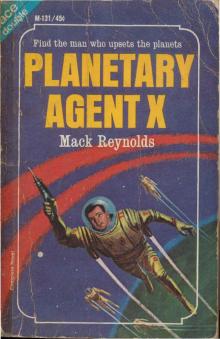 Planetary Agent X
Planetary Agent X Rolltown bh-3
Rolltown bh-3 The Second Mack Reynolds Megapack
The Second Mack Reynolds Megapack Dawnman Planet up-2
Dawnman Planet up-2 Pacifist
Pacifist The Other Time
The Other Time Once Departed
Once Departed IQ
IQ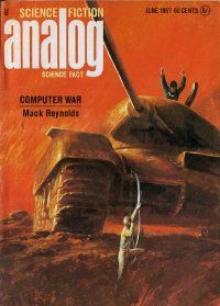 Computer War
Computer War Earth Unaware
Earth Unaware The Rival Rigelians up-3
The Rival Rigelians up-3 Brain World up-7
Brain World up-7 Star Trek - TOS - Mission to Horatius
Star Trek - TOS - Mission to Horatius Amazon Planet up-5
Amazon Planet up-5 The Case of the Little Green Men
The Case of the Little Green Men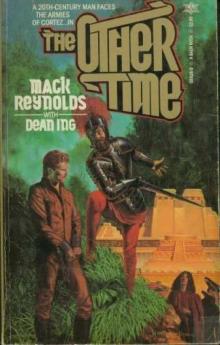 Other Time
Other Time The Mack Reynolds Megapack
The Mack Reynolds Megapack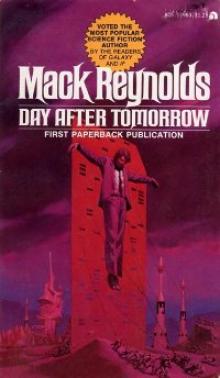 Day After Tomorrow
Day After Tomorrow The Devils & Demons MEGAPACK ®: 25 Modern and Classic Tales
The Devils & Demons MEGAPACK ®: 25 Modern and Classic Tales Mission to Horatius
Mission to Horatius Ability Quotient
Ability Quotient Galactic Medal of Honor
Galactic Medal of Honor Trojan Orbit
Trojan Orbit Code Duello up-4
Code Duello up-4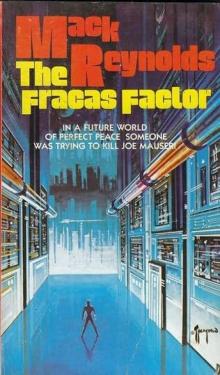 The Fracas Factor
The Fracas Factor The Second Pulp Crime
The Second Pulp Crime Deathwish World
Deathwish World Planetary Agent X up-1
Planetary Agent X up-1 Blackman' Burden na-1
Blackman' Burden na-1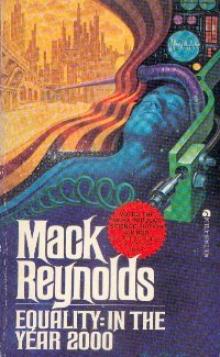 Equality: In the Year 2000 jw-2
Equality: In the Year 2000 jw-2 The Best Ye Breed na-3
The Best Ye Breed na-3 The Jet Set
The Jet Set The Rival Rigelians
The Rival Rigelians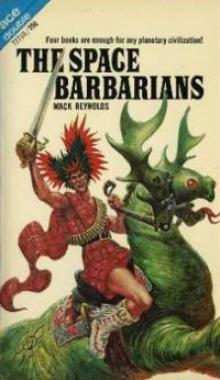 The Space Barbarians
The Space Barbarians